Friday, November 28, 2008
normal service will be resumed (hopefully)
After wars and rumours of wars, I've banned the girls from downloading games, music programs etc until Kingdom Come or I calm down, whichever comes first. I spoke to a very nice lady at Norton who verified the computer hadn't caught a cold. While Norton 2009 was downloading we chatted about the weather, a very British thing. I said it was spitting in the Draughty Old Fen, but that many East Anglians were so rain-averse they wouldn't come out to walk in this weather, whereas in Scotland rain is a fact of life. She said she was in India where it had been raining heavily for two days due to a typhoon in the Bay of Bengal. I don't know enough about Indian weather to hazard a guess that she was on the East Coast. I wanted to ask her if she had any relatives in Mumbai, but didn't have the courage. Maybe a computer with a cough isn't so bad after all.
Sunday, November 23, 2008
Advent 2008 - preparing for the preparation

I went out to a service in the school at the Grassy Old Fen this afternoon with Minora and Minima, while Maxima had a well-earned rest from them making like Mexican jumping beans and me not being happy unless I'm grumpy about something.
We all did different workshops; I was in one ran by Vicar Cantiana on going beyond Mary as she is represented on Christmas cards, using pictures of her as they have appeared through the ages. We started with a reflection on "The Mary of your Christmas Cards", a long reflection written by Katie Baker of Hay and Stardust which started "I am the Mary of your Christmas cards", and continued later:
Do you have a picture of me 30 years after your first picture of me? Am I still dressed in blue? Are there lines on my face? Is my hair now grey?...How I aged in those three years. But am I still young in your picture?"
There were many pictures of and featuring Mary on the table, for example one showing the Holy Family as black people, which Cantiana said had kicked off a conversation on Jesus with some Afro-Carribean youths a while back. Without wanting to get into the vexed question of Jesus' actual appearance, it's not impossible that they'd grown up with, say, the chiselled Scandinavian features of Max von Sydow in The Greatest Story Ever Told, or possibly a confusing array of others in colour, black-and-white, singing, dancing and some outright blasphemous.
One of my favourite images of Mary wasn't there - The Annunciation by James Christensen (top), showing a very frightened teenage girl whose world has just been blown to pieces. We studied the Magnificat in traditional language, then Cantiana read out a "modern Magnificat" which was for me a much-needed reminder of the empowering and emancipatory themes of Mary's song even as her safe life became a thing of the past.

One image which caught my eye was that reproduced below - I'd be grateful if anybody could identify it, so that I could give an attribution.
There's so much going on in the image, I could have contemplated it for ages. The central figures seem to me to be Mary, at the Annunciation, opening her arms in acceptance of Jesus, who is handed over by God while the Holy Spirit blesses Mary. I was reminded of Rublev's icon of the Trinity (above), which has many meanings, but the pertinent one in relation to the below picture is that the Father, Son and Spirit occupy three of the seats at a table with four places. The place facing the viewer is unoccupied, and the beholder feels invited to occupy that place. It seemed that, as well as embracing her unique calling, Mary was representing humankind by taking her place in the life of the Trinity. I was reminded paragraph 24 of the Second Vatican council document on the church in the Modern World (Gaudium et Spes, which looks at Jesus' prayer in John 17:21-22 and speculates that he
implied a certain likeness between the union of the divine Persons, and the unity of God's sons[sic] in truth and charity. This likeness reveals that man, who is the only creature on earth which God willed for itself, cannot fully find himself except through a sincere gift of himself.Below Jesus you can just see the three crosses of Calvary, which is where Jesus is heading, and Mary with him. As Katie Baker meditation continues,
Do you know what it takes to watch your son being crucified? Some parents still do. As they pierced his side, my soul too, was pierced. Do you have a picture of me - in tears, distraught at the anguish of my son? Or am I still the Mary of your Christmas cards?There's two figures to the right of the Holy Spirit, who look like a man and a woman. The man seems to be wearing an ephod and they are raising their hands in celebration - Zecheriah and Elizabeth, parents of John the Baptist? Possibly they are representative not only of the Chosen People coming to Salvation, but also both men and women greeting a man whose attitude to gender equality would show up St Paul to be the man of his time that he was.
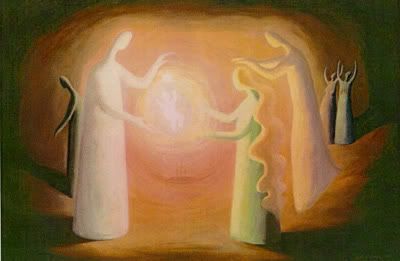
Rev'd Cantiana pointed out that the scene seems to be set in a cave, suggesting the Resurrection - much of the Gospel story in a picture.
The figure to the left, behind the Father and turning away from the whole scene, caused some debate. The prodigal son, perhaps?
The cave setting also got me thinking - a reference to Plato, perhaps? I wasn't trying to be controversial - Plato, a pagan, was referred to by St Augustine as well as Herodotus, Cicero, Tacitus and Aristotle. (Speaking to the Athenians, St Paul quotes the Greek Epimenides of Cnossos when he says that we are God's offspring.)
One of my favourite bloggers, Radagast, aptly summarises Plato's allegory of the cave:
In Plato's allegory of the cave, men who have been prisoners since childhood are kept captive in a cave where they are entertained by the shadows of animals and other creatures including men which are cast upon the cave wall in front of them by the light of a fire. Behind them, the fire burns and others carry wood and stone models in front of the fire to make their shadows dance on the cave walls. The prisoners cannot turn their heads and all of their lives have been convinced that the shadows are real, not just representations of crude models.
For a prisoner who escapes the cave, the light outside is at first unbearable. As he slowly adjusts, the shadows recede into the dimension of illusion as he realises his mistake. But on returning to the cave to announce his discovery, he is greeted with howls of disbelief. He is told that his visit to the outer world has ruined his sight so that he can no longer see straight. Keen to continue in their illusions, the prisoners would even kill him if they could lay hands on him.
While the rejoicing couple are facing the divine scene, the one turning his back to the Father is contemplating his own shadow cast upon the cave wall by the Light.
Elsewhere in the Republic, Plato touches upon an area of concern to myself and Radagast:
And therefore our politic Asclepius may be supposed to have exhibited the power of his art only to persons who, being generally of healthy constitution and habits of life, had a definite ailment; such as these he cured by purges and operations, and bade them live as usual, herein consulting the interests of the State; but bodies which disease had penetrated through and through he would not have attempted to cure by gradual processes of evacuation and infusion: he did not want to lengthen out good-for-nothing lives, or to have weak fathers begetting weaker sons; --if a man was not able to live in the ordinary way he had no business to cure him; for such a cure would have been of no use either to himself, or to the State.
Plato, unlike thinkers such as Hegel or Marx, set his theories in a mythical country. But in the real world, the multitude of sins that hide internationally under the banner of reproductive rights, often used by internationalist non-governmental organisations as a cover for population-control in the sense it was used by eugenicists, are still rolled out.
In this week's New Statesman, Clare Willson outlines tests of a PrEP (Pre-Exposure Prophylaxis) regime to prevent HIV - an awful virus that causes much suffering in all sorts of communities - when exposed to it through unprotected sex and drug-taking. This puts all sorts of people at risk - for example young girls in communities where sex with a virgin is believed to be a cure for HIV/AIDS, prostitutes and people vulnerable to lifestyles leading to drug-use.
Not only that: of the 13 countries listed in the magazine article where trials are taking place, all but four have been mentioned in John Connelly's Fatal Misconception as having been targeted and harmed by the population control/eugenics movement: Ghana, Nigeria, Cameroon, Thailand, Peru, South Africa, Kenya, and Tanzania; places where what for us would be a little thank-you gift for participating in a trial would be positively coercive for some of the individuals concerned.And the US, where, in the only cases we get clinical details of a trial, Dr Marcus Conant is prescribing PrEP "off-label" to sexually active homosexual men ( a group of people whom British eugenicist Marie Stopes referred to as exhibiting "perversion") without any thought as to the horrors that might be wrought by the viruses becoming resistant or changes in evolutionary pressures, ie having forgotten what happened with antibiotics. Other groups involved in the trial are injecting drug-users, "sexually-active women", "high-risk women" and "heterosexual couples where one member is HIV-positive". The tests indicate a mindset which wishes that the Magnificat had never been spoken or Jesus had never reached out to the marginalised.
I don't think it's controversial to say that the Gospel is a Gospel of Life. Which brings me to my last image of Mary, one you don't see on many Christmas cards, but which shows that the world is still in great need of Mary, her Magnificat and her Son. Have a good Advent.

strictly sociopathic - the BBC has bullied us enough

Tonight I cried seeing John Sergeant's last dance on Strictly Come Dancing. Or at least I wanted to join the Facebook group of the same name, referred to in the Telegraph's article on the veteran political journalist's controversial exit from the BBC celebrity dancing competition - better known internationally under its syndicated title Dancing with the Stars, but couldn't locate it. So I joined Facebook's Boycott Strictly until they bring back John Sergeant! instead.
It really is a shame, as I wanted to get in touch with my warm, fuzzy and lachrymose side after being referred by Felix Hominum to the Typealyzer, whose "bloganalysis" of me stated that I "might come across as arrogant, impatient and insensitive to people that need some time to understand what they are talking about." Still, being the "logical and analytical type", I knew all about my arrogance, impatience and insensitivity from the start, and massively intelligent people like myself have no time for crying over shrinking violets who get kicked off variety shows.
To get back to Sergeant, though, he didn't actually get kicked off. He resigned after being bullied by the show's four judges - Len Goodman, Arlene Philips, Bruno Tonioli and Craig Revel Horwood - who would make caustic comments, calling his dancing a "travesty" and referring to him as a "dancing pig", Philips going as far as turning up on BBC Radio 2 (I think it was on the Steve Wright show) specifically to brief against Sergeant. Sergeant had previously commented that the purpose of the show was to entertain, and that the BBC had signed his contract on this with its eyes open, a point he iterated during a press conference explaining his departure:
This attitude from the BBC is reflective of its general tendency to eat its own children when they are no longer ideologically beautiful. Rolf Harris, probably the most talented painter of our time and presenter of the BBC's most popular art programme ever, has spoken of his frustration that he "can't get arrested" by the BBC because of its ageism.
As part of his commitment to charitable giving, Harris is reissuing his 1969 hit Two Little Boys with all proceeds going to The Poppy Appeal on the 90th anniversary year of the end of the First World War.
I can't knock the BBC on the subject of supporting charities. However, if you want to give ethically, charitable giving at a remove can be vexed. For instance, I was quite devastated to find out from Radagast's blog, "Witness to Love", that BBC Children in Need, the brainchild of my hero Terry Wogan and a charity I've supported financially and on this blog, has supported
organisations like Brook Advisory and members of the Association of Medical Research Charities (AMRC) during the last 17 years. Brook Advisory is one of the largest abortion providers in the UK and the AMRC campaigns for the use of human embryos in ‘research’ and supports the development of contraceptive vaccines for use in influencing “world population problems”.I'd like to know if Wogan knows about this and, if he is aware and supportive of it, I think it would be interesting to hear how he defends it.
The big story about the BBC, of course, is that behind criminally obscene phone calls made by Jonathan Ross and Russell Brand on the latter's radio show to the grandfather of a woman Ross claimed Brand had had sex with. The backdrop to this particularly tawdry episode in the decline of a great broadcaster is becoming more and more incriminating to ever more senior BBC managers, it now appears that Lesley Douglas, former Radio 2 controller, didn't even listen to the programme pre-broadcast; who on earth was supervising the woman? And haven't executives realised that the whole farce may have legitimised, in the eyes of some, upsetting phone calls to the families of BBC broadcasters and managers as a valid course of reparative action?
The BBC makes some of the best content in the world, but is also adept at clawing at the bottom of of the barrel - not just with the abovementioned; a general abrasiveness pertains which saw a comedian in Mock the Week make "a highly offensive remark about the Queen" - on a programme that was repeated as the Ross/Brand scandal raged.
In the article linked to above, we are told that David Davis MP is urging people not to pay their licence fees - currently at £139.50 ($208) until the last possible moment. Others, most notably the Spectator's Charles Moore, are spearheading a move not to pay the licence fee at all, but rather to donate the money to charity - in Moore's case, Help the Aged, to highlight the BBC's ageism.
We need to hit the BBC, we need to hit them hard, and we need to keep on hitting. So, tomorrow, Maxima and I are going to get our heads together to discuss what for me may be the second time in my life when I have knowingly broken the law (the first time being when I bought Minora cigarettes, but that's another story). I'm not telling people that they should break the law similarly, but there's certainly a lot of good causes that need money - one I can think of off the top of my head is Across.
As for Strictly Come Dancing, I won't be watching the rest of the series - a subsidiary reason being Len Goodman's remark to dancer Christine Bleakley to "whip off your knickers and swing them in the air", which seems to have been the reason for a remark from host Bruce Forsyth, later in the show, about the programme going out before the watershed. The main reason, however, is that I don't need to watch it any more to find out who won. The moral victory goes to the beautiful, elegant and dignified Kristina Rihanoff, and the equally dignified (if slightly less beautiful) John Sergeant.
Related posts:
The bug letter - when 1 is more than 63,000
what the hell was all that about?
Tuesday, November 18, 2008
blurred boundaries, fine lines - how mad are you? (part 2)
Related Post - Mental - a History of the Madhouse
Tonight BBC2 broadcast the second part of How Mad are You? This is a documentary which repeats, in a controlled environment, David Rosenhan's 1972 experiment whereby "pseudopatients" were admitted to a psychiatric ward - and each of them exited with a diagnosis of mental illness.

Horizon brought together a team of three mental health professionals to assess ten people, knowing that five of them had been diagnosed with a mental illness in the past, but not knowing which five.
Towards the end of the last programme, the team scored a hit when they correctly diagnosed Dan with OCD. Dan went on to explain that he felt proud to have OCD on the basis that your mental illness is part of you - our minds are inside any condition or situation that affects them.
It was to be the last correct call of the first programme. In the second, after an exercise that saw participants trying to shrink a "stretched" photo of themselves on a laptop to what they thought they really looked like, the team noted that, while most people overestimate their size by up to 10%, Alex had done so by 30%. When they asked her if she'd had an eating disorder she replied that she had, and later elucidated that it had nearly cost her her life - but there's always hope: she's been well for 12 years now.
There was much discussion among the professionals - Michael First, Professor of Clinical Psychiatry at Columbia University, psychiatric nurse Ian Hewlett, mental health advisor to the Royal college of Nursing and Richard Bentall, Professor of Clinical Psychology at Bangor University - on what constituted a basis for a diagnosis, and what was merely a part of the personality - as Bentall stated, scratch anybody and you'll find an "eccentricity".
A case in point was a test in which the "patients" had to guess from which unseen tub of different mixes of coloured beads an operator was choosing, one bead at a time. Beforehand we saw the team discussing the significance of the test: it might be useful in helping identify somebody who was prone to delusional thinking, who might make a prediction based upon a less than average amount of beads. Vicky called her choice after one bead was drawn.

The team thought this was very significant, but were cautious: they had wondered if Vicky might have been diagnosed with schizophrenia in the past, but Bentall and First urged caution on the grounds that to present a patient with this diagnosis was the psychiatric equivalent of a diagnosis of cancer.
Except, it isn't always. It's a daunting diagnosis, certainly, but on the BBC's Headroom site is an interview with Stuart (not the documentary's Stuart), who won a travel fellowship from the Winston Churchill Memorial Trust to travel to Everest Base Camp, a "journey of ups-and-downs" to represent his recovery from schizophrenia. Stuart said that the most important advice he could give
 health prefessionals was not to be afraid to give hope to people diagnosed with schizophrenia - "recovery and a meaningful life, while difficult, is possible".
health prefessionals was not to be afraid to give hope to people diagnosed with schizophrenia - "recovery and a meaningful life, while difficult, is possible".Stuart related a tale of being dumped by a date because she had found out his diagnosis by googling him, and told him on the phone "I have to protect my children". His video was on the subject not of schizophrenia but stigma - as one of the taglines from the "time to change" anti-discrimination campaign states, "people found my cancer easier to deal with than my depression".
The team asked Vicky tentatively, "have you ever had a significant psychiatric problem of some kind or other?" she answered that she hadn't, and added "I've always been like this".
To cut a long story short, having been challenged to identify five mentally ill people out of ten the team correctly identified two, and two people were left with what the team had voiced fears over - doubts about what in their behaviour suggested they'd had a psychiatric diagnosis. Significantly (I think) Yasmin, who disclosed at the end of the documentary that she had been diagnosed with depression, had been initially identified by the team as the person least likely to have had a diagnosis. This said to me that mental illness isn't the end; as I've experienced in my own life, recovery is always a possibility.
In one sense it was positive that the team had a 60% failure rate - as Vicky stated, it showed "what a fine line there is" between appearing mentally ill and not; and indeed the programme's Stuart voiced relief at having recovered so much from the bipolar disorder that had cost his his relationship that he appeared "well" to a panel of three top mental health professionals. They themselves had commented how blurred the boundaries between diagnoses could be, to such an extent that at one point they considered "swapping" a participant's diagnosis from depression to bipolar disorder.
Beyond the fine lines and blurred boundaries, however, is the reality of many in-patient wards today. In the documentary, the team had access to DVD footage of the participants' tests, and of much of their day. In too many wards there is a rushed, hassled team, sometimes labouring under a hierarchical system (although this is changing), passing information across to each other and up the line to others who don't have time to see individuals for great amounts of time.
In some localities, ward closures mean that only the most ill people can get an in-patient place, which increases pressure on the staff - and it has to be said that dealing with a wardful of people which can contain some floridly psychotic patients, other very anxious people and still other deeply depressed individuals isn't the easiest working environment in the first place.
There is hope, however - self-help groups are flourishing, including in cyberspace, and groups like "time to change" are working to break down preconceptions and stigma. Hopefully their work will include the aforementioned phenomena as they exist among mental-health workers too, including advice on how to treat those who fall into the cracks between diagnostic categories, and how to be big enough to say something that can be hard to say: "got it wrong there".
The most positive thing about this 2-part documentay, I think, was that I wouldn't have picked anybody out from the 10 participants as having had a mental illness.
At one point Ian Hewlett stated that, the statistics on having a serious episode of mental illness being 1 in 4, "we're not talking about 'them', we're talking about us", upon which Richard Bentall disclosed that he'd suffered from depression earlier in his life. I can remember a time when having been sectioned (certified) would have militated against being accepted for training as a psychiatric nurse but now, thank God, this is no longer a bar.
Congratulations again to all the individuals involved in How Mad are You, participants and professionals alike, for their courage.
View the documentaries on BBC i-player until 23 December 2008:
How mad are you? - Part 1
How mad are you? - Part 2
You can also find many useful mental health resources with Ruby Wax at Ruby's Room.
Monday, November 17, 2008
bullies breaking society's bonds - so bin the box
Staff at the Red Balloon Learner Centre in Cambridge have found some children so badly bullied that they haven't been to school for a year, and whose subsequent feelings of complete unworthiness are firmly entrenched.
Even so, I was astounded to read an article by Robert Winnett, Deputy Political Editor of the Telegraph, stating that in 98.5% of cases, children suspended from school for bullying are returned to the same class to prey on their victims again. In many localities schools are forced to pay for private tuition for excluded pupils, therefore if cash is strapped, as it usually is, exclusions will be forced to a bare minimum. Only 80 children were excluded from state schools specifically for bullying last year, out of 2000 who were excluded for violence - from a total of over 62,000 who committed acts of violence, more than 8,000 of these being towards teachers.
The trouble, it seems to me, is that all over the West stormtroopers of the liberal-socialist axis have walked a covert revolution into swathes of our educational, scientific, entertainment, administrative and governmental institutions since the 1970's, and the vanguard are now where they had intended to end up - occupying key positions where they can harm (sorry, "deconstruct") society with their sociopathic convictions, in many cases ignoring good counsel from people they employ. So although it's very laudable aiming anti-bullying week at children, it should be noted that it is from the adult-led structures of liberal oppression that bullying trickles down to children, who become what they behold.
A manifestation of this is the view that people who bully others are themselves "victims" who are in need of nothing stronger than "therapy" which presupposes that treating them like besandalled liberals will turn them into the same, all warm and fuzzy with no rough edges. The leads to, at one end of the spectrum, a primary school in Cambridgeshire with a garden that lets children calm down with a bit of work out in the open, instead of having to stay in the classroom, that will produce results they can see and hold and eat. The trouble is, it's only available to children who exhibit challenging behaviour...see the flaw?
At the other end of the spectrum, we have a process that identified a woman living in an
 alternative family arrangement, therefore Haringey Social Services managers closed their ears to the concerns of workers on the ground about her son; you can follow the case of Baby P in the news. This illustrates starkly the chaos wrought when social services managers assume that members of certain groups are not only impeccable but untouchable, in the teeth of dire warnings from people on the ground. Another example is last year's independent inquiry into the managerial and supervisory setups at Wakefield Council following a couple having been arrested for abusing four children they had fostered between 2003-2005. The problem? Because Ian Wathey and Craig Faunch were gay, social workers found their careers threatened if they should voice concerns that they might be abusers to their managers. (I must say that in the many years I've met social workers through my work, I haven't met a PC crusader in a long time - they infest the upper echelons now.)
alternative family arrangement, therefore Haringey Social Services managers closed their ears to the concerns of workers on the ground about her son; you can follow the case of Baby P in the news. This illustrates starkly the chaos wrought when social services managers assume that members of certain groups are not only impeccable but untouchable, in the teeth of dire warnings from people on the ground. Another example is last year's independent inquiry into the managerial and supervisory setups at Wakefield Council following a couple having been arrested for abusing four children they had fostered between 2003-2005. The problem? Because Ian Wathey and Craig Faunch were gay, social workers found their careers threatened if they should voice concerns that they might be abusers to their managers. (I must say that in the many years I've met social workers through my work, I haven't met a PC crusader in a long time - they infest the upper echelons now.)We are increasingly becoming nations of unhappy people, and I'm not surprised by a University of Maryland report stating that unhappy people watch more TV than happier ones, who tend to read, socialise and even vote more often.
 Bullying is big business on TV. Last year, Channel Four's Celebrity Big Brother let Jade Goody's racist bullying of Bollywood star Shilpa Shetty carry on because it attracted viewers; but the ratings war yeilded a Pyrrhic victory as riots in India coincided with Gordon Brown's visit there, Carphone Warehouse dropped out as sponsors and 50,000 complaints were received. But, nevertheless, bullying is big business, so Channel 4 let it happen all over again with Big Brother 9.
Bullying is big business on TV. Last year, Channel Four's Celebrity Big Brother let Jade Goody's racist bullying of Bollywood star Shilpa Shetty carry on because it attracted viewers; but the ratings war yeilded a Pyrrhic victory as riots in India coincided with Gordon Brown's visit there, Carphone Warehouse dropped out as sponsors and 50,000 complaints were received. But, nevertheless, bullying is big business, so Channel 4 let it happen all over again with Big Brother 9.Alternatively, during the campaigning for this year's US elections, shortly after John McCain picked Sarah Palin as running mate, Democr
 ats soon discovered their reactionary sides when they criticised her, basically, for being a mother in a public place. Things got very nasty when it was alleged that her newborn daughter was in reality her own daughter's child; to (then) Senator Obama's credit (something I'm not that used to saying) he reacted swiftly to insist that family members were off-limits. It would send a stronger message about the President-Elect's sense of fair play if he were to announce an inquiry about who targeted two minors, one a newborn baby with special needs - and upon whose orders.
ats soon discovered their reactionary sides when they criticised her, basically, for being a mother in a public place. Things got very nasty when it was alleged that her newborn daughter was in reality her own daughter's child; to (then) Senator Obama's credit (something I'm not that used to saying) he reacted swiftly to insist that family members were off-limits. It would send a stronger message about the President-Elect's sense of fair play if he were to announce an inquiry about who targeted two minors, one a newborn baby with special needs - and upon whose orders.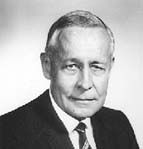 The climate-change industry owes far more to bullying than it ever did to science. In his book The Deniers, Lawrence Solomon tells the story of Roger Revelle, who in the 1960's alerted a young student of his called Al Gore to his studies on climate change, but later changed his mind, writing to Senator Tim Wirth in 1988 "It is not yet obvious that this summer's hot weather and drought are the result of a global climatic change or simply an example of the uncertainty of climate variability". Gore's reaction was that Revelle (who died in 1991) had become senile. This treatment was also meted out to David Bellamy, who subscribed to the climate ch
The climate-change industry owes far more to bullying than it ever did to science. In his book The Deniers, Lawrence Solomon tells the story of Roger Revelle, who in the 1960's alerted a young student of his called Al Gore to his studies on climate change, but later changed his mind, writing to Senator Tim Wirth in 1988 "It is not yet obvious that this summer's hot weather and drought are the result of a global climatic change or simply an example of the uncertainty of climate variability". Gore's reaction was that Revelle (who died in 1991) had become senile. This treatment was also meted out to David Bellamy, who subscribed to the climate ch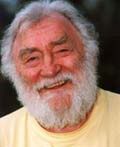 ange theory as late as 1988, but in 2004 described it as "a load of poppycock" in the Daily Mail; Plantlife International instructed him to step down as President, The Royal Society of Wildlife Trusts refused to renew his presidency, and, echoing the Revelle case, there were "charges of mental incompetency", for example the Carbon Trust's description of "the very sad and deluded David Bellamy". Significantly, the climate change movement is using local government resources and the media - predominanty TV - to encourage children to use "pester power" on their parents to prevent "eco-crimes".
ange theory as late as 1988, but in 2004 described it as "a load of poppycock" in the Daily Mail; Plantlife International instructed him to step down as President, The Royal Society of Wildlife Trusts refused to renew his presidency, and, echoing the Revelle case, there were "charges of mental incompetency", for example the Carbon Trust's description of "the very sad and deluded David Bellamy". Significantly, the climate change movement is using local government resources and the media - predominanty TV - to encourage children to use "pester power" on their parents to prevent "eco-crimes".Radagast, a senior teacher in a faith school, writes in his blog Witness to Love about the effects of TV upon children:
With a media so often dedicated to profit, consumerism, celebrity and a liberal-elite agenda, it should be no surprise that many children's views are similarly shaped. Television, says William Kilpatrick author of Why Johnny Can't tell Right from Wrong, "defines what is and is not important" (264) and shapes the reality of viewers by conferring significance upon events by paying attention to them, or denying them significance by ignoring them...For many children I talk to, television programming offers 'realism' and 'entertainment' and they would be reluctant to give it up. However, the kind of 'realism' and 'entertainment' about the world on offer in many media-driven productions is not realism at all. It is a distorted picture of reality, often dominated by secular values and without any connection to the transcendent. The image of man and especially of the family that emerges in many programmes is often grossly one-sided.In a sense, entertainment and other institutions have seen the truth in the Jesuits' maxim, "Give me the child and I'll show you the man[sic]" by turning it round for their own purposes, There are signs of hope, however - one of the most popular BBC programmes of all time (around the world) is Doctor Who, and it's spin-off for children The Sarah Jane Adventures. These science-fiction series usually take the form of morality tales, centred around the premise that acting others' good is to be desired, and wrong is objectively, well, wrong. It's ironic that they have come from the organisation which gave us the egregious Jonathan Ross/Russell Brand incident, where a 78-year-old man was bullied by the aforesaid with criminally obscene messages left on his answerphone about his granddaughter.
Ironic too that the most bullying government ever to be foisted upon Great Britain has, through its own thinktank, Foresight, rediscovered things we need to do to regain our happiness. These include activities like developing relationships with friends and families, having hobbies, and helping friends and strangers - all simple things, which many of us learnt not from thinktanks but at our mothers' knees, and which start with switching off the telly.
Saturday, November 15, 2008
children in need of morally competent adults

In today's Telegraph, Christopher Howse speaks of the moral philosopher G.E.M. (Elisabeth) Anscombe, starting by quoting her entry in the Oxford Dictionary of Biography - "all her children were told how to prepare meals".
Sometimes it feels that Minora and I are drifting apart, possibly like many adolescent girls and their Dads. There've been times when I should have been the bridge-builder after a spat, but in reality it is she who has eased the path with a culinary concoction, which may come from a range of books from my Granny's 1920 book of "Plain Cookery Recipes" from the Edinburgh School of Cookery and Domestic Economy to Maxima's Weightwatchers' Cookbook.
Food can be a strong tie between parents and children - case in point: parents passing fish and chips to their children through the railings of Rawmarsh community School in South Yorkshire when Jamie Oliver was brought in to oversee a school meals policy which, while it may have been ideologically healthy, was not at all popular...and I'd like to know why the Government hasn't yet noticed that chips are in fact healthy; they're made from potatoes.
Unfortunately, sometimes ties from children to parents aren't always reciprocated. During this year's Children in Need telethon, Terry Wogan said, "if you've read the papers over the last couple of weeks, you've an idea what can happen to children". This, I believe, was a reference to the awful case of "Baby P", a 17-month-old child who was murdered after being visited 60 times by services in Haringey, the borough in London where Victoria Climbié was slaughtered under the gaze of social and other services - and six months after former Haringey social worker Nevres Kemal wrote of her fears that another Victoria Climbié situation was waiting to happen to the then Secretary of State for Health Patricia Hewitt, copying her letter to then junior health ministers Rosie Winterton and Ivan Lewis, as well as local MP David Lammy.
Children in Need started in 1980 as "the telethon", presented by Terry Wogan, Sue Lawley and Esther Rantzen. The latter went on to found Childline, which played an invaluable role in providing children with the means to report abuse; but she came to regret that the concept of child protection was hijacked by "insidious jobsworths" who had an agenda to suppress competitive games and any risky activity whatever.
Of the three, only Wogan has remained with the yearly event, now in its 28th year, quickly replacing histrionics with hilarity - probably the most efficient way to break down barriers and facilitate empathy with people who are different to us.
And to open wallets. Last year, Children in Need raised £19 million on the night. It had been widely forecast that in the light of the economic downturn a more modest total should be anticipated, but by the end of the night of 14th November Sir Terry's humour, humility and happy surrealism had helped garner nearly £21 million - with the help of many friends, for example the soap opera Eastenders' take on several West End musicals:
The thing is, there seem to be more children in need every year. But what are they in need of? In some cases the answer is simple - motorised wheelchairs that enable participation in sports, for example, or nurses to look after one brave young chap who had survived a difficult birth with multiple disabilities, to be a source of inspiration and love to his family.
One vignette showed a boy in his early teens who had all but given up on his Dad, who was addicted to crack. One had the uncomfortable impression, in the light of recent news, that the lad was representative of a tsunami of anomie; but this young man was working to make his community a better place - he wasn't content to assume the victim status that much of the mainstream media demand in return for fifteen minutes of fame.
It occurs to me that Children in Need is unusual in the modern BBC, because it not only assumes but demands moral givens: that children have a right to childhood, and we have a duty to protect it. It is beset by many slings and arrows, for example the illusion that sexual "freedom" (which usually refers to men's freedom to love and leave women) has benefits which trickle down to children. While Ludwig Wittgenstein, Elisabeth Anscombe's mentor, averred that ethical statements belonged in the same realm as art and aesthetics, Anscombe beleived that, for instance, if you owed money, your obligation to repay the debt was as much a fact as the debenture's existence. She wrote in 1972:
If Christian standards of chastity were widely observed the world would be enormously much happier. Our world, for example, is littered with deserted wives - partly through that fantastic con that went on for such a long time about how it was part of liberation for women to have dead easy divorce: amazing - these wives often struggling to bring up young children or abandoned to loneliness in middle age. And how many miseries and hang-ups are associated with loss of innocence in youth! What miserable messes people keep on making, to their own and others' grief, by dishonourable sexual relationships!It's not necessary to take such an overtly Christian view to maintain a moral outlook: Kant's moral imperative was categorical, ie one should do the right thing regardless of one's inclinations, and it should be assumed that any single situation which presents a moral dilemma must be addressed as if the solution to that situation constitute a universal law.
Maxima once suggested to me that the conflicts I have with Minora point to the freedom she has to have such conflicts. Freedom sometimes seems like British gold reserves - non-existent, but still widely regarded as valuable. But, year after year, Children in Need shows that many young people aren't content with fools' illusions - they want the real thing. And while Sir Terry is in charge of Children in Need, nothing but the real thing will do.
The Bill Children in Need 2008
BBC newsreaders perform songs from Mama Mia! Children in need 2008
Eastenders tribute to the Beatles, Children in Need 2007
BBC newsreaders perform All that Jazz from Chicago Children in Need 2007
Eastenders tribute to Queen for Children in Need
Coronation Street Stars perform songs from Oliver! for Children in Need

Wednesday, November 12, 2008
Hannah wins - but why was she forced to fight?
The hospital disagreed, and decided she should be made a ward of court, so that she could have than be forced to have the operation. This is the point at which I start to wonder about aspects of the story.
The decision to have her taken to hospital is said to have been taken by a locum doctor; but for the court order to have any force it would have been necessary to prevent her parents - who are supportive of her decision - from being able to take her home. NSPCC research on Emergency Protection Orders states that police and social workers would have been involved - and indeed, locum doctor or not, it is unthinkable that Hereford Hospital's child protection team would not have swung into action, involving on-call senior nurses and hospital social workers who would contact the professionals involved with her treatment, for example staff at Birmingham Children's Hospital to whom she voiced her wish. Hannah's Mum, formerly a nursing sister in an intensive care ward, describes a proceedure more often used to separate a child from violent or negligent carers:
[The doctor] was saying, 'Bring her into hospital now or I shall send the police and an ambulance and a nurse to come and fetch her'. It was terribly frightening. It was in the evening and you can't get a solicitor and [Hannah's] social workers have disappeared for the weekend, and we have to tell the three young children they have to be good, and be quiet, and Hannah might cry, she might not want to go. But we have to let her go if they do come, because otherwise we wouldn't be allowed to visit her in hospital."Hannah's maturity and understanding of a condition which would render many adults speechless ensured that a child protection officer sent to speak to her stopped the hospital's bid to mobilise the High Court dead. As her Dad states, "Hannah had been through enough already and to have the added stress of a possible court hearing or being forcibly taken into hospital is disgraceful".
Personally I'm not concerned that this case oils a slippery slope. Hannah has no obligation to undergo "heroic" lifesaving proceedures that may very well hasten her death. But my concerns about this case are those expressed by the Telegraph's George Pitcher - that the "assisted suicide" lobby will react like Pavlov's dogs to the phrase "right to die" and appropriate her heartbreaking case as a bolster for their own rickety structures.
But one thing seems to be getting overlooked. Chairman of the British Medical Association, Dr Tony Calland, states "I think obviously a child of 13 with these circumstances should be perfectly capable of making the decision and particularly when supported by the parents".
The operative words are "a child of 13". In England and Wales, this is the minimum age at which a child's consent to anything can be taken as meaningful, although this is not made public often. Despite the system of assessing a child's competence to consent to a proceedure, what in the end ensured Hannah's right to a natural death with some dignity is that she has turned 13.
In the age where 11-12 year-old girls are given vaccinations against sexually-transmitted diseases and sex education is planned for toddlers - with no indication that assessments of competency are planned for members of both these groups anyway - the government is trampling the law of the land underfoot and undermining its own obligation to look after children in the name of a warped sense of freedom, where freedom to choose what is not ideologically acceptable is not an option. This case, where a hospital was prepared to send in the troops to force a normal, loving traditional family to comply with its own way of thinking (but was foiled by a 13-year-old girl who loves Enid Blyton and Disney) is a perfect illustration.
Hannah clarifies her decision not to have the heart transplant that shows a wisdom through suffering that belies her age:
"I know there is a big waiting list for heart transplants...and I am happy to save someone else's life."
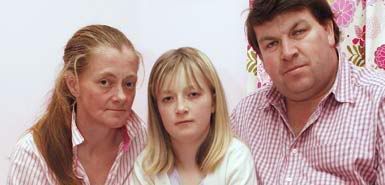
Tuesday, November 11, 2008
good taste back on the horizon - how mad are you? (part 1)
Related Post - Mental: a History of the Madhouse
 BBC2's Horizon has long been my favourite documentary series, and tonight's, I think, was one of the most important documentaries they've ever screened.
BBC2's Horizon has long been my favourite documentary series, and tonight's, I think, was one of the most important documentaries they've ever screened.How mad are you? saw ten people brought together in an English castle converted into a hotel - five with a diagnosis of a mental illness, and five without any such diagnosis, who were described as, for want of a better word, "normal".
They were not allowed to discuss any real or perceived history of mental health issues with each other or, more importantly, with the three leading mental health professionals, two psychologists and a psychiatric nurse, whose job it was to work out who had a mental illness and who didn't.
And what a t
 eam they'd brought together - Michael First, Professor of Clinical Psychiatry at Columbia University and editor of the latest incarnation of the world-famous psychiatric diagnostic manual, DSM_V, psychiatric nurse Ian Hewlett, mental health advisor to the Royal college of Nursing, and Richard Bentall, Professor of Clinical Psychology at Bangor University.
eam they'd brought together - Michael First, Professor of Clinical Psychiatry at Columbia University and editor of the latest incarnation of the world-famous psychiatric diagnostic manual, DSM_V, psychiatric nurse Ian Hewlett, mental health advisor to the Royal college of Nursing, and Richard Bentall, Professor of Clinical Psychology at Bangor University.It was a controlled rerun of a famous experiment conducted by David Rosenhan in 1972 which is summarised by the title of Rosenhan's 1973 paper, On being sane in insane places. Basically, "pseudopatients" - sane people pretending to have symptoms of mental health problems - were admitted to various psychiatric hospitals claiming that they heard an unknown voice of the same sex as themselves saying "empty", "hollow" and "thud".
The results still make surprising reading. While many patients in the psychiatric wards correctly surmised that their peers were not suffering a mental illness, each of the eight pseudopatents was diagnosed with a mental illness by psychologists - one with manic depression (bipolar affective disorder) and the rest with schizophrenia. Their in-patient stays ranged from 7 to 52 days, with one pseudopatient being detained for two months.
Our mental health professionals, who knew that this was a similar experiment, did well by the end of the programme, correctly identified a man with obsessive compulsive disorder - then fell over their own feet by telling a lady she was the "most normal" of the ten and unlikely to have a mental illness, only for her to inform them, "you're wrong", but felt unable to expand.
It wasn't their only gaffe in this invaluable study of how diagnoses are made. A lady whom the professionals supected of being depressed was given the task of leading a team through the forest in a paintball exercise - and suceeded, confounding their prediction that her conditional clause "if we lose" equated to an expectation: "we will lose" (their assumption, in my mind, being "because I'll make sure we do.")
When I started training to be a psychiatric nurse, we were told the most useful definition of psychiatry I've ever heard: "a blind man in a dark room looking for a black cat that isn't there". In my placements I saw many signs of hope in a profession that was struggling to pull itself up by the bootstraps, but also once witnessed a macho, preening staff nurse tell one of his charges, "you're a sectioned [detained] patient and you'll behave as such!". And there were, of course, the results of past prejudice: I saw some ladies in their last years who had been admitted for having had a baby out of wedlock, and one chap who had been admitted during the First World War with a diagnosis of "idle and lazy" - all had long lost their skills to function in anything other than a very controlled environment, and most, although sane when admitted, were (to use the documentary's word) mad.
Not all of the prejudice has gone. Coming up to modern times, I once told a colleague, a fellow mental health professional, that I had a diagnosis of manic depression. He eyed me intently and replied, "but you don't look manic depressive!" This not too long before the professionals working for Horizon opined that their mistake proved that you couldn't tell if somebody was mentally ill by looking at them.
There was a coda to the Rosenhan experiments. He informed a teaching hospital that
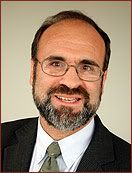 pseudopatients were going to be admitted over a fixed period of time. In that duration, over 40 pseudopatients were identified, and again over 40 suspected to be pseudopatients but not proven. In reality, no pseudopatients had been admitted.
pseudopatients were going to be admitted over a fixed period of time. In that duration, over 40 pseudopatients were identified, and again over 40 suspected to be pseudopatients but not proven. In reality, no pseudopatients had been admitted.Rosenhan's critics protested that in making a diagnosis of mental illness it was necessary to listen to what the patients were saying. And there's the rub - during my first hospitalisation, I was in a ward where there was a policy that your named keyworkers would make contact with you once a day. And this they did - often by patting your elbow as they passed and asking "you ok?" It's contact, true, but in a way to which we are societally programmed to respond in the affirmative. This was the information on which the psychiatrist would make his assessment and diagnosis.
Eventually, when my wife found herself able to unload to me what she'd been told very soon after my admission - "he's a mental health worker and knows the right buttons to press to get attention" (in reality I spent most of that admission sitting by my bedside deteriorating) - the worker who said this had disappeared into the community, having done their regulation 6 months in an acute ward that qualified them for this. I was left wondering, was it the nurses who informed the psychiatrist's opinion on this, or did it go the other way round?
Thankfully I was eventually transferred to a ward where the Sister cared for her staff as much as her patients, resulting in a steady core of staff who had been there for many years. You could tell that the atmosphere was different shortly after walking onto the ward. May God bless her.

It is incredibly brave of all the participants to take part in this experiment, both the "patients" and the professionals. I look forward to next week's conclusion, and to the debates I hope will follow about what can go wrong in the mental-health diagnostic process and how to put it right.
It's ironic that with this documentary the BBC has shown how good its broadcasting can get, so shortly after the Ross/Brand case-study in how to run a contempt-driven service. In part 2 of How Mad are You? the mental health team will try to figure out which of the remaining eight have a diagnosis of mental illness, and which simply have ubiquitious character traits that no more comprise an illness than a headache does the Black Death. If the BBC were a patient, one wonders if it might emerge from the experiment with a diagnosis...corporate manic depression, perhaps, or maybe institutionalised personality disorder?
View the documentaries onBBC i-player until 23 December 2008:
How mad are you? - Part 1
How mad are you? - Part 2
You can also find many useful mental health resources with Ruby Wax at Ruby's Room.
Monday, November 10, 2008
they give their tomorrows for our today
I've watched the Royal British Legion Festival of Remembrance for as long as I can remember, first with my Mum, then with my wife, now with our children. The tears start at a different point every year.
They came late this year: what set me off was two young children presenting a posy of
 poppies to Air Marshal Ian McFadyen, President of the Royal British Legion (RBL). Possibly I was thinking of the sacrifices that might be asked of our young people - to date 220 have died in Afghanistan and Iraq - which was to be underlined the next day at the Remembrance Sunday Service at St Gallicus, where Scouts, Cubs, Girl Guides and Brownies presented their standards to the altar together with the Royal British Legion and the Royal Signals. There's a Royal Signals Territorial Army barracks in Cambridge - the TA celebrates its hundredth anniversary this year.
poppies to Air Marshal Ian McFadyen, President of the Royal British Legion (RBL). Possibly I was thinking of the sacrifices that might be asked of our young people - to date 220 have died in Afghanistan and Iraq - which was to be underlined the next day at the Remembrance Sunday Service at St Gallicus, where Scouts, Cubs, Girl Guides and Brownies presented their standards to the altar together with the Royal British Legion and the Royal Signals. There's a Royal Signals Territorial Army barracks in Cambridge - the TA celebrates its hundredth anniversary this year.The Remembrance celebrations are full of history.
For example, one of the many, many regiments and organisations represented the Albert Hall during the festival of Remembrance, and on Sunday at the Cenotaph where the Queen led officials, veterans and widows in laying wreaths, was the Royal Scots, which was formed in 1633 under a royal warrant from King Charles I in order to fight in what became the Thirty Years' War in France, and another was the King's Own Scottish Borderers, which was raised in 1689 to support William of Orange against the Jacobites, who wanted to restore the deposed Stewart dynasty to the throne. Also represented was my grandad's old regiment, the Argyll & Sutherland Highlanders, and the Cheshire Regiment, also raised upon the accession of William and Mary and, until its incorporatation into the Mercian Regiment in 2006 was one of the last unamalgamated regiments in the British Army (and the first three have been amalgamated into the Royal Scottis
 h Regiment).
h Regiment).The Festival of Remembrance is for all the forces, of course, and it was amazing to see the Band of Her Majesty's Royal Marines perform an intricate march to the theme tune from Rocky, including a burning guitar solo.
Also present was the Bomber command Association, the subject of a campaign by the Daily Telegraph to have a medal struck in honour of the "bomber boys" bravery. This issue has been dodged by successive governments despite Bomber Command's 55,000 losses, possibly due to Arthur "Bomber" Harris' bombing strategies, which undoubtedly shortened the war - for example, with the Dresden raids the RAF showed by targeting the German city furthest from England that there was nowhere in the Reich that could be considered as safe.
This recalls a present campaign by the Royal British Legion for the Government to honour the military covenant, the agreement by which the government will care for wounded forces personnel and their families in return for their putting their lives on the line. David Cameron has appointed best-selling author Frederick Forsyth to look at how this covenant, which is "well and truly broken", can be repaired. Forsyth writes:
In the United States, men and women in uniform are applauded on the streets; in this country, some commanding officers have advised forces not to wear uniforms in public because it might create public hostility.Indeed, in an episode of a series of "Power to the People" called The Battle of Trafalgar Square, presenter Tim Samuels told the story of a seriously wounded soldier who, upon his arrival at an A&E unit in Great Britain, was told to take his uniform off in case it offended anybody. If that's not bad enough, the "aftercare" was worse: "He was told there were no beds, given a walking stick and told to go and see his GP. "

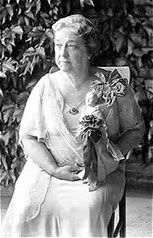 The RBL records that the Poppy Appeal, whereby we honour the fallen and wounded by wearing a poppy on the jacket or shirt or blouse, started in 1921 and was inspired by John McCrae's poem In Flanders' Field. The motive force was an American War Secretary and YMCA worker from Georgia called Moina Michael (left). Gordon Brown instituted Veterans' Day in 2006, and I hope that again we follow America's example by declaring it a public holiday.
The RBL records that the Poppy Appeal, whereby we honour the fallen and wounded by wearing a poppy on the jacket or shirt or blouse, started in 1921 and was inspired by John McCrae's poem In Flanders' Field. The motive force was an American War Secretary and YMCA worker from Georgia called Moina Michael (left). Gordon Brown instituted Veterans' Day in 2006, and I hope that again we follow America's example by declaring it a public holiday.In the Draughty Old Fen, after the Service, we walked to the war memorial and the Royal British Legion laid its wreath, followed by the Royal Signals, then the Scouts and Girl Guides, then the parish council. There were a lot of families there, a lot of children - some of them forces personnel of the future - who did not forget to remember. A bugler played the last post while the sound of the wind in the unfallen autumn leaves recalled the falling poppy-leaves of the previous night's ceremony in the Royal Albert Hall. Rector Pellegrina had told the story of how poppies, which thrive in churned-up land, were found in abundance at the sites of battles in France. She had wound up her sermon with the hope that one day all the tears would turn to joy. Amen to that.

Friday, November 7, 2008
faith schools - teaching unions versus teachers
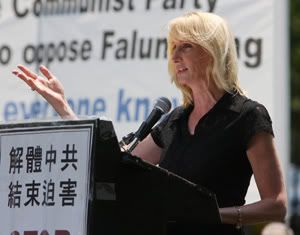 This August, as part of his series on The Genius of Charles Darwin, Richard Dawkins interviewed Wendy Wright, President of Concerned Women for America, about the controversy surrounding the teaching of creationism in school as opposed to evolution. In my opinion, Wright displayed her greater cognitive agility by stating that in a controversial subject such as that of creationism versus evolution, pupils should learn both sides of the debate.
This August, as part of his series on The Genius of Charles Darwin, Richard Dawkins interviewed Wendy Wright, President of Concerned Women for America, about the controversy surrounding the teaching of creationism in school as opposed to evolution. In my opinion, Wright displayed her greater cognitive agility by stating that in a controversial subject such as that of creationism versus evolution, pupils should learn both sides of the debate.Today, Martin Beckford, religious affairs correspondent of the Telegraph, reported on a poll by teachers.tv which produced some unexpected but reassuring statistics. Although half of the teachers in the 1200 surveyed disagreed that creationism should be given parity with evolution in the classroom, a third - a very significant minority - thought that parity was appropriate - and indeed just under a third already consider creationism as equal to evolution.
 Another statistic showed that the controversy over Professor Michael Reiss being ousted from his position as Director of Education at the Royal Society is far from dead (Professor Reiss opined that creationism should be taught in schools and was promptly ousted by a cabal of scientists whose figurehead was Dawkins; Sir Richard Roberts called Reiss's vocation "very worrisome"):
Another statistic showed that the controversy over Professor Michael Reiss being ousted from his position as Director of Education at the Royal Society is far from dead (Professor Reiss opined that creationism should be taught in schools and was promptly ousted by a cabal of scientists whose figurehead was Dawkins; Sir Richard Roberts called Reiss's vocation "very worrisome"):Nearly half (49.9%) of teachers also agreed with Professor Michael Reiss’ sentiment that excluding alternative explanations to evolution is counter-productive and alienates pupils from science.What this figure suggests is that some of those teachers who disagree that creationism should be weighted equally with evolution support a place for creationism in the syllabus. Dawkins' retort to Ms Wright on the issue of teaching both was that he was all for teaching children to think for themselves, but there were limits. In neglecting to explain what he thought these limits were, he ceded the position of freer-thinker to Wright, who had probably held it all along.
This is in the context, I believe, of a rather loaded dialogue on the role of faith schools in society that has been going on for a couple of years in the open, but which bodies of a certain ideological shade have been pursuing covertly for decades.
The NASUWT (National Union of Schoolmasters/Union of Women Teachers) brought out a consultation document this year called Keeping the Faith, which in the body of the text constructs a balanced argument about the role of religion in education, but in the conclusion comes out in favour of a British Humanist Association publication called A Better Way Forward, which concludes that all religions should be given equal weight: while a valid proposal for a phenomonological study, this is an insult to each and every religion so considered, no matter the religion/denomination of the school. Translating the argument into another sphere, can you imagine a physical education class in Texas which was looking into baseball and situated the Texas Rangers as being no different from the Yankees?
 The above study involved only one religious group, the Catholic Education Service, despite the fact that in Great Britain there are schools of other faiths: the 2004 report by Dr Richard Stone, Islamophobia, stated that there were nearly 7,000 state religious schools in the UK, of which 33 were Jewish, 2 Sikh, 1 Greek Orthodox and 1 Seventh Day Adventist; of the rest, one paper puts the numbers at over 4,700 Church of England schools, and just over 2,100 Roman Catholic schools. As a member of the Church of England, I feel I detect an agenda: go for the Catholics first, then mop up the rest. This is a time to stick together.
The above study involved only one religious group, the Catholic Education Service, despite the fact that in Great Britain there are schools of other faiths: the 2004 report by Dr Richard Stone, Islamophobia, stated that there were nearly 7,000 state religious schools in the UK, of which 33 were Jewish, 2 Sikh, 1 Greek Orthodox and 1 Seventh Day Adventist; of the rest, one paper puts the numbers at over 4,700 Church of England schools, and just over 2,100 Roman Catholic schools. As a member of the Church of England, I feel I detect an agenda: go for the Catholics first, then mop up the rest. This is a time to stick together.The NUT (National Union of Teachers)has called for an end to funding of faith schools, and says in a typical passage in its document, In Good Faith:
Human equality in all its dimensions should be affirmed and celebrated. The importance of working for the elimination of any faith-based homophobia, transphobia and institutionalised prejudice towards lesbian, gay, bisexual and transgender people is vital.I am reminded of a robustly pro-gay friend who chose me as the first person to come to and voice her concerns about a circle of gay men, not well liked in the LGBT community, who were running a competition on how young a boyfriend they could pull. I hope that free-thinking gay people, should they read passages like that quoted above, will reply, "not in my name".
In case the NUT paper wasn't circulated widely enough, it was summarised on a Marxist website, by NUT activist Kirsty Paton, under the title, "Schools are for teaching, not for preaching". The author states that, having heard arguments from the Catholic Church and the Church of England in favour of retaining faith schools, "fortunately we then had the opportunity to listen to the views of the British Humanist Association, the National Secular Society (NSS) and Women against Fundamentalism all of whom explained why faith schools should be opposed".
I am against fundamentalism in all its forms, which is why I am in favour of faith schools: if you believe that after a worthless life we turn to dust, then there are no limits to what you might do; if, on the other hand, you suspect that Hell might be possible, then you are an invaluable pointer to Heaven. God bless you.
Tuesday, November 4, 2008
what the hell was all that about?
Tomorrow night
 , Channel 5 will broadcast a documentary featuring a burlesque artiste with the name Voluptua with a title similar to the above, although being a fan of customisation I've chosen my own imprecation.
, Channel 5 will broadcast a documentary featuring a burlesque artiste with the name Voluptua with a title similar to the above, although being a fan of customisation I've chosen my own imprecation.For those unsure of the situation, the Daily Mail's Melanie Philips published an article on 27 October detailing the implications of a situation that not many of us were aware of: on Saturday, October 18, Russell Brand had Jonathan Ross as a guest on his BBC 2 radio show. Andrew Sachs, a venerable veteran of TV and radio, was due to do an interview over the phone, but was unavailable, therefore messages were left. The messages were about sexual relations the pair, but especially Ross, claimed to have had with Sachs' granddaughter, Georgina Baillie (Voluptua), and an attempted apology in the form of a song was even more explicit; their view was the immature, sexist and even misogynist one that if a woman does a certain job then she is "fair game" - and so, apparently, is her 78-year-old granddad.
The show has an audience of about 400,000 mostly young people (com
 pared with, say, 8 million of all ages for the station's Sir Terry Wogan), so comment on the show initially eddied lazily around various Facebooks, Bebo's, etc. Two complaints were made, after which the segment was pulled from the show's podcast and listen-again site.
pared with, say, 8 million of all ages for the station's Sir Terry Wogan), so comment on the show initially eddied lazily around various Facebooks, Bebo's, etc. Two complaints were made, after which the segment was pulled from the show's podcast and listen-again site.After Ms Philip's article, complaints had reached 18,000 by 31 October, and around another 20,000 accumulated in another two days. The BBC called it a record number, but that record actually belongs to Jerry Springer - The Opera (63,000 complaints with no heads rolled).
To cut things short, on 29 October - a full 11 days after the incident, Brand and Ross were suspended, and Brand resigned. The following day Radio 2 Controller Lesley Thomas, who had worked her way up from the post of production assistant, resigned.
What the controversy was about was that the show was not broadcast live, but had been recorded beforehand so that a producer could check through for offensive material. None was marked up on the appropriate sheet. The two managers over the producer were on holiday - but isn't that what the on-call system is for?
Even so, the person there with the sheet should have known that putting Jonathan Ross and Russell Brand in the same room would require going through the recording with a fine-tooth comb, because both of these figures have form.
Jonathan Ross has sexually humiliated Gwyneth Paltrow, Nicole Kidman and Halle Berry, among others, on his Friday night TV show. Russell Brand showed up for a show dressed as Osama bin Laden on September 12 2001, called George Bush a "retarded cowboy" on TV, and on the same MTV awards show claimed to have "won" a purity ring - a sign of a vow to remain chaste until marriage popular in the US - from a male star. (Could be that he was feeding his sex addiction, except he seems to regard sex with relish. Take it from a former addictions worker, Russell, if you experience significant positive reinforcement - ie if you enjoy it - it's not an addiction...)
The political reaction has been strong - so much so that the incident stood shoulder-to-shoulder with the American election and the recession in last week's Spectator. David Cameron said, "we need to know who made the decision to broadcast it? How high up the editorial chain did it go? Who examined it? Why did they conclude that it should be broadcast?" Having said that, Ross burnt his boats there when he made obscene remarks to the Conservative leader about Baroness Thatcher on his show; I'd like to know whether he merely wanted to take Cameron down a peg, or was also under instructions to do so.
The Prime Minister demanded that the BBC take "appropriate action." In the light of what a report by the "Stop BBC Bias" group in 2004 alleging a "cosy" relationship between the two organisations with frequent "job-swapping", including Tom Kelly, Martin Sixsmith and Bill Bush, what "appropriate action" might be makes the mind boggle.
Mary Whitehouse might not have approved of Baillie's burlesque group, the Satanic Sluts, but she would have known right away how to deal with Brand's and Ross's treatment of hte performer. She would have written to the Prime Minister to say that legally it was the Government who was responsible for the BBC - because they had no answer to this, then PM Harold Wilson's office's reaction was to "lose" the letters. In similar fashion, the BBC initially appeared to have "lost" Andrew Sachs' complaint about the Brand/Ross phone calls, but was later forced to admit that this was a lie.

BBC Director General Mark Thompson seems to be getting ready to go for the Gordon Brown award for mobilising lifeboats from the ship you've just scuttled by saying how quickly the BBC (eventually) reacted. No doubt, as in any monolithic organisation, he'll then proceed to airbrush out the truth by dissolving the facts in a deconstructionist substrate that leaves nothing but a series of narrative strands of equal (ie no) value. He will then invest in Ross and Brand's future by piling all the corporation's sins upon their back, thus facilitating their eventual return as victims. Except...it's happened again.
On Sunday night, a show that Jeremy Clarkson had pre-recorded and that was passed by BBC executives was broadcast, containing Clarkson's assertion that being a lorry driver is "a hard job - change gear, change gear, change gear, check your mirrors, murder a prostitute, change gear, change gear, murder" (possibly a reference to the conviction of a lorry-driver - the "Suffolk Strangler" - in Ipswich earlier this year for murdering five prostitutes).
We need to respond to the BBC's constant attempts to corrupt our children, atta
 ck our faiths and abuse uninvolved bystanders by complaining, complaining and complaining again - and not settling for the bug letter.
ck our faiths and abuse uninvolved bystanders by complaining, complaining and complaining again - and not settling for the bug letter.Apart from obviously Mr Sachs, the greatest injustice in this case seems to have been visited upon Lesley Douglas - I wish she hadn't seen, or been shown, the need to resign. The incident happened on Mark Thompson's shift as well as hers. She caused consternation with her decisions to hire Chris Evans for the drivetime show and Jeremy Vine to take over Sir Jimmy Young's talk-show, but was proved to have a sense for pure gold.
Part and parcel of being as senior as Mark Thompson is includes 24/7 responsibility - everything that happens does so on your shift; as the sign on US President Harry Truman's desk proclaimed, "The Buck Stops Here". Hopefully, as Mr Thompson realises that this isn't going to go away, he will realise the wisdom of inviting her back for some tea and humble pie.
Related posts:
the bug letter: when 1 is more than 63,000
strictly sociopathic - the BBC has bullied us enough
Saturday, November 1, 2008
Fatal Misconception - The Struggle to Control World Population
Matthew Connelly
pp520
Harvard University Press 2008
"Those who cannot remember the past are condemned to repeat it."I begin with this often-misquoted phrase from George Santayana because the story of birth-control as national and transnational policy seems to be that of recurring bouts of "collective amnesia", as Connolly puts it. For example, Connelly cites a screening of the pro-life film The Great Population Hoax at IPPF headquarters which caused activists to complain about arguments using distortions of the truth; manager Julian Heddy had to admit that these were actual claims made by earlier population-control advocates.George Santayana
In order to test the prevalence of population control in recent times, after the prejudices, avoidable tragedies and wilful negligence, I leafed through today's Daily Telegraph. I found a story about how Pakistan is to receive a $9 billion (£5.6 billion) loan from the IMF, but would not like a full-blown IMF program because "it would likely come with painful conditions to cut government spending that could affect programs for the poor".
Wondering what these might be, I looked through some IMF papers for other countries, and found a Senegal Poverty Reduction Strategy Paper from 2006 which contained a statement on page 38 that one of the priority objectives of this was population control.
I've already blogged about how social Darwinism evolved into eugenics. I knew that Darwin himself was horrified by the former phenomenon, but it surprised me to learn that he complained to Annie Besant during her phase as a eugenicist (before she became a mystic philosopher) that eugenics interfered with natural selection. I considered myself quite informed on these matters, but this was only one of countless revelations in Matthew Connelly's intensely-researched tome on how population control was all about controlling other folks' populations. Shortly into my first session with Fatal Misconception, I realised I was reading one of the most important books of my life.
One of the key dogmas of eugenics was maintaining the purity of one's people. When Margaret Sanger realised that those concerned about this were coalescing into a discrete movement, two of the names she thought of calling it were "neo-Malthusianism" and "race control", before she decided on "birth control". An American, her British counterpart, Marie Stopes, stated that she wanted to recruit from "healthy, well-conditioned individuals only", and that "Constructive Birth Control will fill the comfortable cradles and empty the gutters".
The Birth Control Movement was ostensibly an internationalist movement seeking a world government in order to eliminate war. But what they were about was the future of the white race (whatever that is), and at the time eliminating the "yellow peril" (although at the International Neo-Malthusian and Birth Control Conference in New York in 1925, Indian nationalist Taraknath Das complained about the "white peril).
India was a target for Sanger and her followers from the start, and during Connelly's exposition of the whole sordid affair as a case-study I had to remind myself several times that I wasn't reading a horror story but modern history.
A measure of the morality of the Birth Control movement can be gleaned from his description of Margaret Sanger "criss-crossing" India dispensing spermicidal foam, almost totally unarmed with information as to its safety. It seems not to have bothered her that a similar foam, distributed to African Americans by "notorious racist" Lydia DeVilbiss, was causing side-effects, but finally sent her foam away for analysis upon learning that DeVilbiss' concoction had caused adverse effects when tested upon dogs.
Following the 1951 census, Indian Prime Minister Jawaharlal Nehru "called for free sterilisation and contraception when recommended on medical grounds, and suggested that where feasible it should be given for social and economic reasons as well". India would never be the same. (It should be noted that Hellen Keller, the deaf-blind pioneer, wrote to Sanger breathlessly congratulating her for founding the Planned Parenthood foundation in India in 1952. I find this rather strange, as Sanger referred to the blind, deaf and mute as "this dead weight of human waste" in her 1922 book The Pivot of Civilization - and Marie Stopes wrote her son Harry out of her will because he married a woman - daughter of "bouncing bomb" inventor Barnes Wallis - with hereditary short-sightedness.)
The International Planned Parenthood Federation (IPPF) had maintained a presence in India for two decades before Nehru gave them the go-ahead, and responded to their mission with a Neitzschean optimism: "India is the cauldron in which mankind will be tested". Farce ensued immediately - during their 5-year study in the Punjab husbands and wives would answer intrusive questions about their sex-lives differently, and by the time their trial on birth-control ended, the birth-rate was greater than when it began. (They weren't the only ones falling over their own feet; a Swedish trial in nearby Ceylon - now Sri Lanka - couldn't prove the effectiveness of contraceptives after two years.)
The degree to which the Indian population control program contributed to the Emergency and its conclusion will, I think, be a subject for debate until Kingdom Come. But abuses in order to increase "acceptors" were a part of the program from the beginning. Intrauterine Devices (IUD's), which had been found to be a cause of heavy bleeding and ectopic pregnancy in programs in Hong Kong, Puerto Rico, Pakistan and other countries, were being used widely, and the UN promised follow-ups in India to catch complications early, despite there being one health visitor per 40,000 people in India. Men who refused sterilization were denied pay-rises and promotions, and by the late '6o's payments were being made both to be vasectomised and to recruit others.
Mass sterilisation was praised in 1960 by Time, and when the Emergency was declared in 1975 Indira Ghandi's son Sanjay commented that it was an "appropriate atmosphere" for tackling what DN Pai, director of family planning in Maharashtra, called "people pollution". What was effectively coercive for poor people became mandatory. Connelly explains:
Sterilization became a condition not just for land allotments, but for irrigation, water, electricity, ration cards, rickshaw licenses, medical care, pay raises, and promotions. Everyone, from senior government officials to train conductors to policemen, was given a sterilization quota."One of Sanjay's circle, Ruksana Sultana, demanded that Muslims who were begging her to have the demolition of their houses stopped - the idea being that sterilization certificates be produced to get alternative accomodation - produce 300 people for sterilization in return, and had to be rescued from the resulting riot by police who eventually gained control by firing live ammunition into the crowd.
However, Gandhi had two qualities that just about all senior population controllers at the time lacked: she was a woman and a mother. She became depressed over the suffering of her people and called an election - and was robustly defeated.
Another tragedy of India is that the population control could have been different. On December 3, 1935, Margaret Sanger had an audience with Mahatma Gandhi concerning population control, and told Time, "He just didn't know much about the subject." In reality, Gandhi was a proponent of natural family planning, which he thought strengthened self-control. Connelly speculates that she didn't publicize Gandhi's views on natural family planning because "it was endorsed by a growing number of Catholics".
Sanger was, in fact, deeply anti-Catholic, and indeed when she left the American Birth Control League "when she found she could no longer control it" she called its house journal, Birth Control Review, "no different from 'all the little Catholic papers'". Connolly continues:
Whatever their differences, Sanger insisted that all these [birth control] groups shared "one common enemy, one group of opposition objecting to everything we do or say - the Catholic Church".This attitude still thrives: in September of this year John Smeaton highlighted tactics which were contrived to be offensive to Christians in general, but to Catholics in particular, and the British HFEA (Human Fertilisation and Embryology Authority) still excludes pro-lifers, which in some circles is taken to be a synonym for Catholic. There are, however, two things to be thankful for: firstly, Roman Catholics still swell the ranks of pro-lifers, and secondly, they have been joined by people of other religions and none - there are pro-life Anglicans, Baptists, Methodists, Protestants, Jews, Hindus, atheists, pagans - the list goes on and on and on...
Despite the abuses of the Indian birth control campaign, in 1983 Indira Gandhi, returned to power, shared the first United Nations Population Award - with Xinzhong Qian, Soviet-trained former soldier who was one of the masterminds of the Chinese population control campaign.
Birth control being what it says on the tin, ie control, it's surprising that it wasn't embraced wholeheartedly by a Communist country before China started considering it in the late seventies.
The IPPF's program in China, states Connelly, was "no secret". Stephen Mosher, later President of the Population Research Institute, brought back reports such as that from a Guangdong village:
Eighteen women who were at least five months pregnant, "red-eyed from lack of sleep and crying", were told they would have to undergo abortions, in two cases by Caeserian section. Through such means, China registered 7.9 million abortions, 13.5 million IUD insertions, and almost 7 million sterilizations in 1979...Yet, though the riots in India had barely died down, it was as though they had never happened - despite the repercussions of the Indian fiasco reaching not just Pakistan, but also countries as diverse as Iran, Indonesia and the Philippines and contributing to the overthrow of more than one government. Yet, says Connolly, "senior IPPF staff had their eyes wide open" regarding the China campaign, whose aims, according to the United Nations Population Fund (UNFPA) were not just to reduce "overpopulation" but to "raise the quality of population from the point of view of eugenics, education and ethics". With people who could remember newsreels detailing the horrors of Belsen, Auschwitz etc at the time of their liberation still in employment, eugenics was back.
And it's back this time without necessarily being imposed from above - witness sex-selective abortions in India and China facilitated by ultrasound machines. In the light of modern preoccupations with all things genetic, Connolly refers to people "faithfully reciting a eugenic catechism without the faintest idea of where it came from or where it can lead". For example, while in Australia a child has been born after surviving an ectopic pregnancy, in Britain doctors have been given permission to screen embryos for cosmetic defects, with a view to destroying the ones that don't match expectations, the defects including squints and even hair colour.
One thing gynaecologists and obstetricians have always agreed upon is that there is no difference between a baby before birth and one after. This is why in 2006 the Royal College of Obstetricians and Gynaecologists proposed infanticide for the sickest babies on the grounds, among other things, of the costs of looking after them - and Connelly notes that the population control agenda gathered steam during the financial crises of the 1930's. In the US, Senator Barack Obama is reckoned to have voted against the Born Alive Infants Protection Act, which would protect babies who have survived abortion from being murdered. (In the UK, whose population is around a fifth of that of the US, fifty babies a year are estimated to survive abortion.)
What we're looking at here is an attempt to formally renunciate the broad medical concensus that once a baby has taken its first breath it is a human being. I'm reminded of Philip K Dick's 1973 short story The Pre-Persons, in which a child can be "aborted" up to the age of 12 , and even then is only safe if he/she can prove a certain degree of mathematical ability. I wish I could say it's still in the realms of sci-fi, but earlier this year Australian doctor and bioethicist Fr Joseph Tham estimated that infanticide would be "normalised" in 50 years. An online friend has alerted me to the philosophy of Dr Peter Singer, an animal liberationist who believes that animals are people but that babies can be killed up to 28 days post-birth. (Connelly refers to a pressure group called Zero Population Growth, which in 1969 wanted to exterminate humanity but give other primates an antidote so they would survive.)
What will happen? Will the "collective amnesia" of policymakers draw us to catastrophe once more, so that in the reaction we can once more cry "Never again"?
But population planners have an enemy that they cannot forever subjugate. Connelly describes how the Emergency ended - "Something more powerful, even more implacable, had finally defeated the ideology of population control: People voting, one by one."










